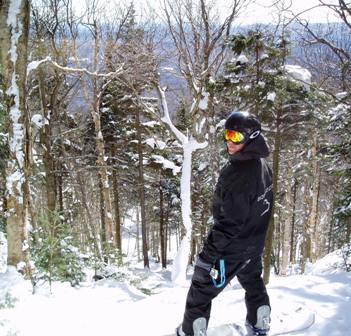
Poised: Steve Golby wrapped up warm in highly clement conditions
The next Olympics: what now for snow sport?
The next Olympic Games will not be held in Rio de Janeiro but Sochi in Russia. Steve Golby considers the post-London 2012 landscape from the perspective of the summer Olympics’ winter cousin and what it means for the UK's snow-based representatives.

Poised: Steve Golby wrapped up warm in highly clement conditions
The kaleidoscope of euphoria and benevolence that was London 2012 has raised the spirits of the global Olympic movement, including its sports, governance, people, athletes, sponsors and the global audience. For a short while international politics and policies took a back seat. Sport itself seems to have rejuvenated its sporting persona and its culture. Team GB, and with it the UK, has basked in the success achieved in the arena, with each national governing body of sport pressing forward to deliver and support the Team GB talent pool, and although the London Games are now in the past the legacy is being delivered to spur on the current generation and their successors.
Within the next four-year cycle we are now looking forward to the antipodeans of the summer Olympics, the winter Games, and, with the medal gained by Amy Williams in the skeleton in the 2010 winter Games and more investment trusted to snow sports in the UK, you could say the future looks bright. With more and more UK athletes making their mark in the extreme world of snow sports you could even be forgiven for persuading yourself to reach a state of high excitement.
However, is this a true reflection of snow sport in the UK? With UK Sport still dealing with the solvency of Snowsport GB and with the re- organisation of Snowsport England taking place under the guarding arms of Sport England , I wonder whether real change is taking place or if this is just a swing in perception.
America’s Generation X grew up with snowboarding, breaking boundaries and creating a creative culture, allowing self- expression through riding and lifestyle. Ultimately this also took skiing into this new culture alongside snowboarding. Americans have held on to this newly enriched culture, and to their accomplishments within it, exporting it across continents for other countries to develop their sports and their own athletes. Unfortunately the UK, traditionally obliged to take to the Alps, has been an onlooker. The growth of indoor slopes has offered a helping hand but competitions are still too often held abroad or as part of a commercial music festival, selling products to a made-up audience.
All this poses some fundamental questions for snow sports in the UK. Are the providers of the governance for snow sports in the UK initiating a creative culture of self-expression or are we still breathing down the neck of the UK in the 1980s where a class division decides whether you are a snowboarder or a skier? And the ultimate question remains : is the funding for these sports genuinely promoting a level playing field with a legacy that thrives on a culture that breeds participation and supports athletes selected on the basis of the skills? Or not?
Steve Golby has experienced top-level snow sport culture first-hand as a competitor and as a part of the Stratton Mountain Snowsport programme in the US, which provides a venue for Olympic athletes to train. Steve has also written a strategic document for Snow Sport England following the completion of an MA in event management.
The Leisure Review, November 2012
© Copyright of all material on this site is retained by The Leisure Review or the individual contributors where stated. Contact The Leisure Review for details.
Download a pdf version of this article for printing